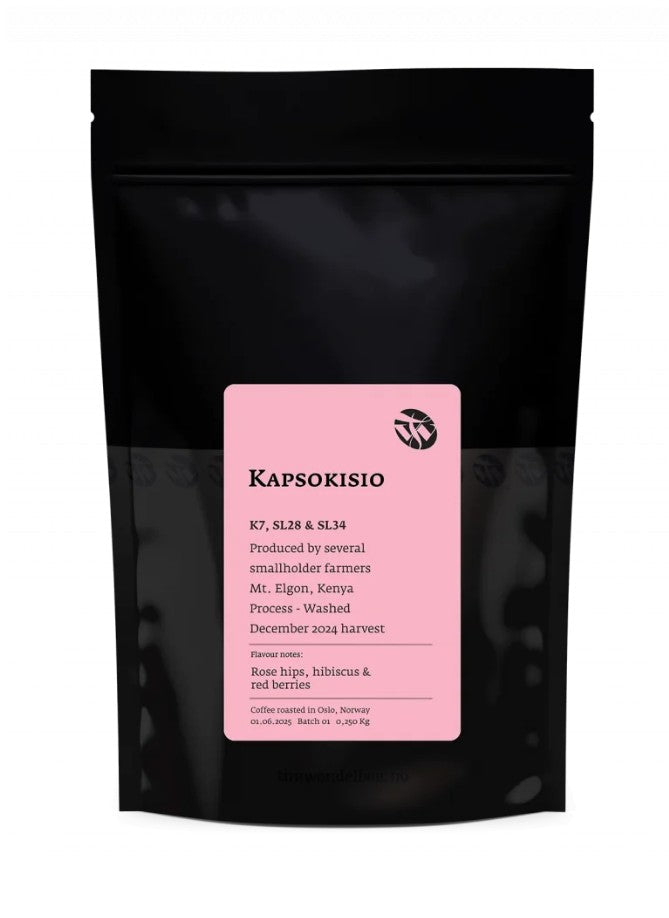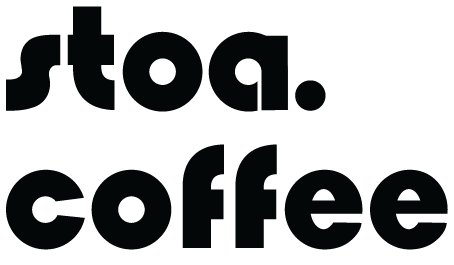stoa coffee
Tim Wendelboe - Kapsokisio - (Kenya, Washed, K7/SL28/SL34)
Tim Wendelboe - Kapsokisio - (Kenya, Washed, K7/SL28/SL34)
Couldn't load pickup availability
Tasting Notes: Rose hips, Hibiscus, Red berries
This Kenyan coffee from the Kapsokisio wet mill has intense flavours of rhubarb, rose hips, hibiscus and fresh red berries.
Cultivar
K7, SL28 & SL34
Flavour Notes
Rose hips, hibiscus & red berries
Producer
Several smallholders farmers
Country
Kenya
Region
Mount Elgon
Process
Washed
Harvest
December 2024
Roast Profile
Light Roast
Bag Size
250g
Contents
Whole Coffee Beans
Tim's Notes
About 90% of the farmers who deliver cherries to the Kapsokisio wet mill grow the K7 cultivar, which means only about 10% of the coffee is SL28 and SL34 cultivars . This is probably one of the main reasons why the Kapsokisio coffees taste so different from the coffees from central-Kenya.
When we started buying coffee from Kapsokisio in 2012, the cooperative was struggling with drying capacity during the peak of the harvest, which is when the best coffees are processed. Therefore in 2013 we decided to invest in building new drying tables at the wet mill in order to increase the drying capacity at the factory. We managed to raise about $10 000 USD from our customers during our 6th and 7th anniversary that was donated to Kapsokisio in order to have new drying beds built.
Ever since we have always been trying to get our hands on some coffee from this wet mill as it is such a unique coffee with crisp fruity flavours.
Cultivar
This coffee is produced by several hundred farmers, most of them mainly growing the K7 cultivar with some farmers also producing the SL28 and SL34 cultivars.
K7 was released in Kenya in 1936 after selections from the original population by Scott Agricultural Laboratories. It is still planted and produced in Kenya and most farmers who deliver cherries to the Kapsokisio wet mill are still producing K7. Recent genetic tests have confirmed that K7 is related to the Bourbon genetic group.
Process
Picking and sorting
- The coffee cherries are typically hand picked by the farmers and their family members. After delivering the coffee cherries to the wet mill the good coffee cherries are separated from the inferior ones by hand sorting and they are delivered in separate cherry hoppers.
Depupling, fermenting & washing
- The cherries are depulped and graded by using an old Aagard disc de-pulper that uses water and gravity to sort dense beans from less dense beans. Coffee of different grades are moved to separate fermentation tanks where the parchment coffee, with it’s mucilage still on, is dry fermented for about 12-16 hours over night. After fermentation the coffee is washed in clean water and graded once again by gravity. The more dense beans are dried separately from the beans with lower density and inferior quality.
Drying
- The coffees are dried on elevated drying tables, where defect parchment coffee gets sorted out by hand. Drying the coffee takes about 10 – 14 days. During daytime the coffees are raked to ensure even drying. The drying tables are covered during the hottest times of the day to avoid over heating and also at night time to prevent condensation. The drying process is finished when the moisture content in the coffee beans is between 10-12%. After drying, the coffees are stored in conditioning bins before delivery to the dry mill. The coffees we buy from Kenya are always vacuum packed before it is shipped to Norway.
Share


